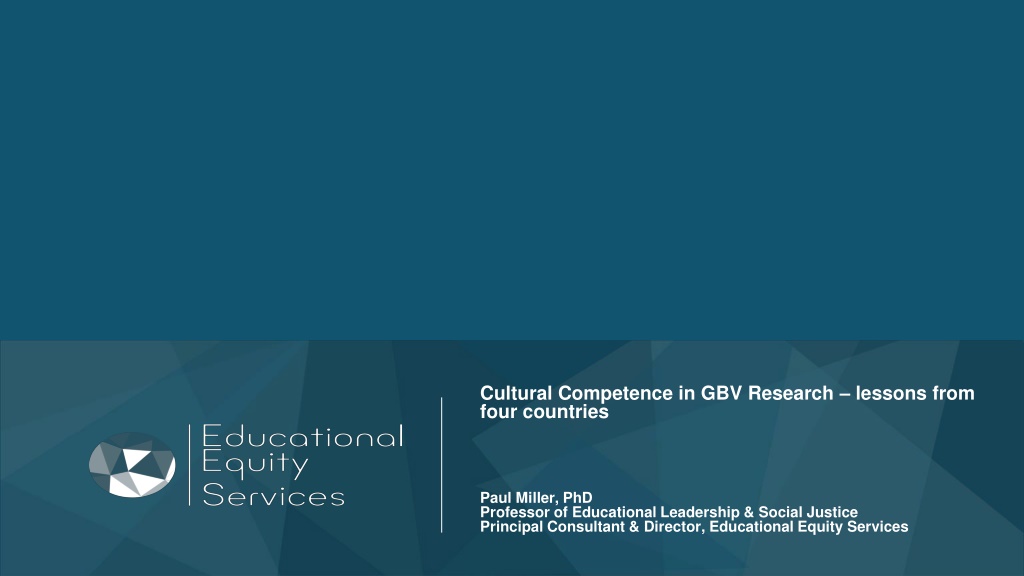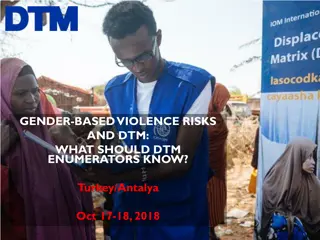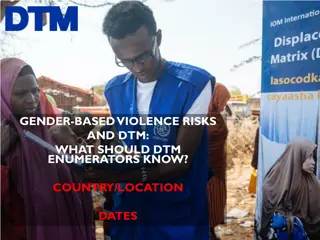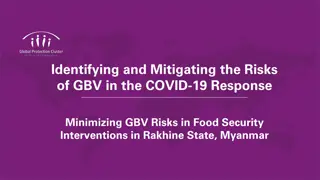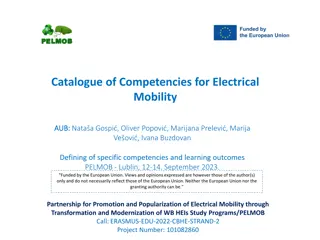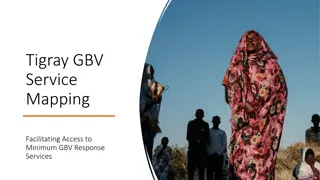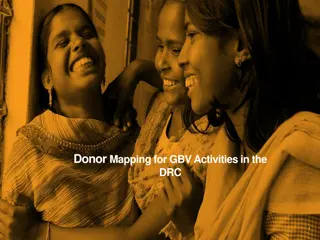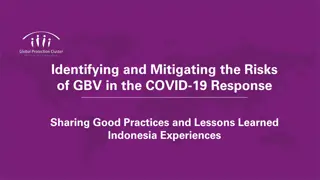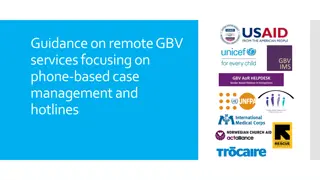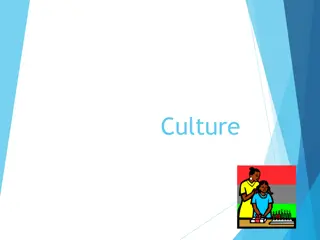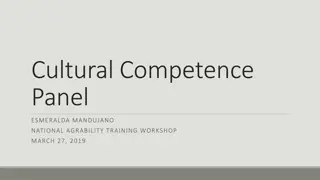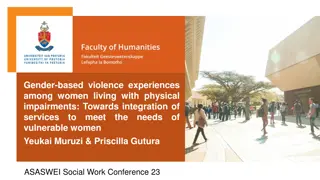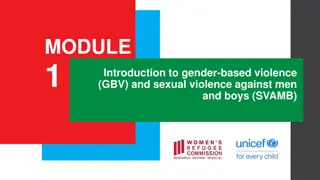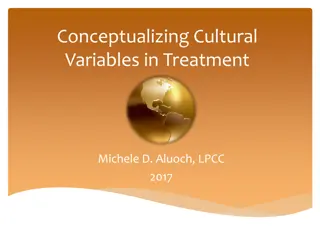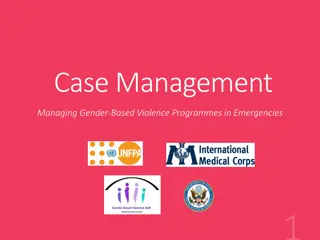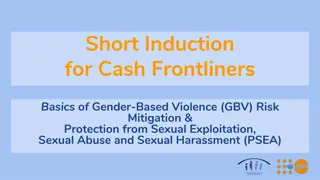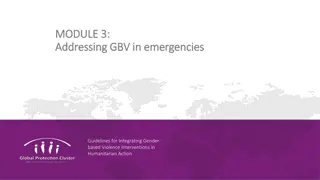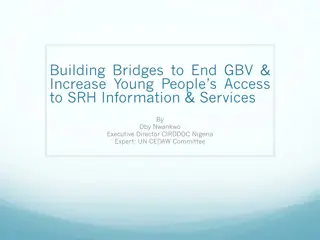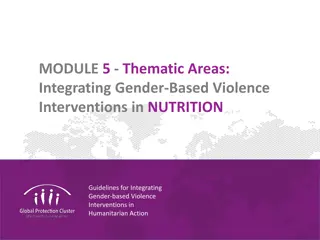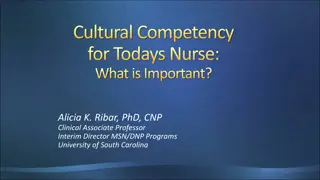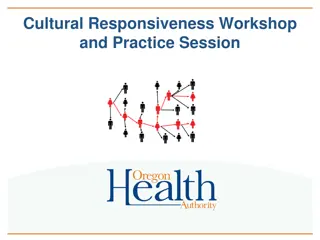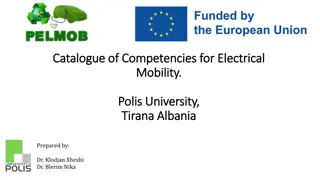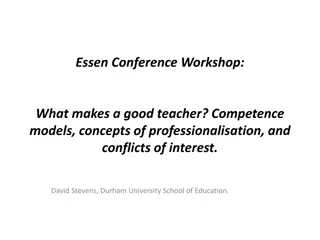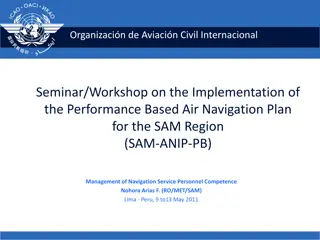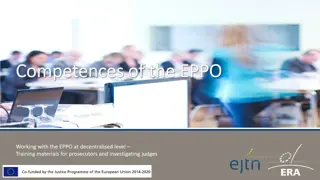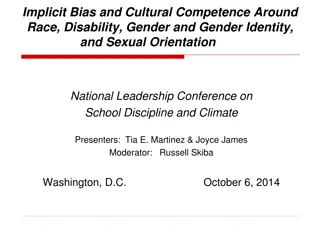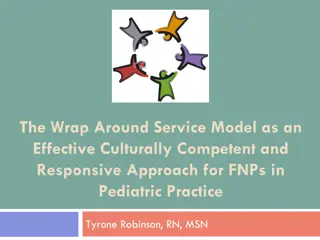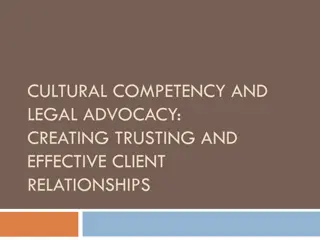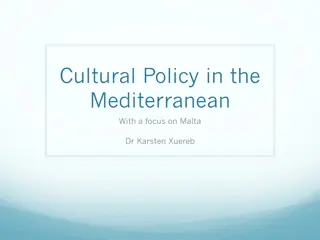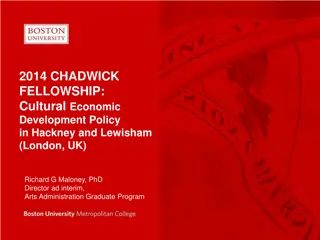Understanding Cultural Competence in GBV Research
Cultural competence in research involves recognizing and respecting the unique characteristics of the populations being studied. It is essential for effective study design, participant engagement, data collection, and interpretation. Cultural competence ensures research aligns with the target population's needs and promotes inclusivity in research processes. Examples from India, Jamaica, Uganda, and the UK highlight the importance of obtaining necessary permissions and approvals for research involving diverse populations.
Download Presentation

Please find below an Image/Link to download the presentation.
The content on the website is provided AS IS for your information and personal use only. It may not be sold, licensed, or shared on other websites without obtaining consent from the author. Download presentation by click this link. If you encounter any issues during the download, it is possible that the publisher has removed the file from their server.
E N D
Presentation Transcript
Cultural Competence in GBV Research lessons from four countries Paul Miller, PhD Professor of Educational Leadership & Social Justice Principal Consultant & Director, Educational Equity Services
What is cultural competence in research? Cultural competence refers to an awareness of the unique and defining characteristics of the population/s from which researchers wish to participants (e.g.: gender, location, age, ethnicity, SES, etc) Cultural competence includes identifying and understanding social, cultural and other influences on participants beliefs and behaviours. Cultural competence therefore encompasses a researcher s understanding of his/her study participants, and this awareness is manifested in the design, conduct and interpretation of findings.
Why does it matter? Cultural competence plays a critical role in study design and implementation processes, including the development of research questions and hypotheses, outreach and recruitment strategies, consent activities, data collection protocols, analysing and interpreting findings, drawing conclusions and presenting the results. Cultural competence promotes and provides cultural congruence (respect for and appreciation of participants unique characteristics, etc) and helps to ensure the research can be adapted to meet the target population s soci al, cultural and linguistic needs. Depending on the type of research, cultural competence can be crucial to successfully recruiting and retaining diverse individuals as study subjects.
Access India: the collaborating institution had to sign a Memorandum of Understanding with the State government as well as a permission letter from the Education Department of the Municipal Corporation of Mumbai before permission was granted to approach schools, Jamaica: two separate ministry approvals were required (Ministry of Health and Ministry of Education, Youth & Information). UK: school leaders are free to decide which [research] projects to support.
Access Uganda: At national level, we obtained clearance from the Uganda Ministry of Education and Sports (MOES) and Kampala Capital City Authority (KCAA) to access schools in the city. We then moved to the districts, where we approached the Chief Administrative Officers (CAOs)-the heads of the technical wing at the district) for approval. The CAOs typically referred us to the District education office for guidance on how to proceed. The officials in the district education office were very helpful in the sampling process. For schools in the Municipal Councils, additional authorization was obtained from both the Town Clerks and Principal Education Officers. From the local authorities the team directly approached the selected schools. Detailed explanation of the study was provided to the school administrators which they relied on to make a decision (Uganda).
Advice India: First is to have enough back ups Second, fieldwork in India is a complicated process and requires dedicated workers whose primary focus should be on strategizing/liaising with not only institutions but also ministries and individuals who occupy positions of power. Third, understanding that every sector has its own set of gatekeepers and in the field of school education it is important to recognise the work of NGOs and CBOs and form alliances with them as well ..Additionally, access is only achievable when we are able to inform the gatekeepers about the relevance of the issue, however sometimes it is impossible for researchers to get access because of structural issues and because the people in power are disinterested in accepting change in the status quo. Knowing where to commit and where to let go is pivotal in gaining access to institutions. Uganda: It is important for the researchers to obtain clearance from the responsible authorities at national and local levels [if required]. Secondly, building relationships with the school administrators in advance is critical. It is also important to identify a contact person for the study at the school level. However, most schools in Uganda are understaffed, the teachers are underpaid and demotivated. Therefore, most of them are usually unwilling to take on any extra duties. Planning for ways to compensate for their time can help to boost their morale to support research activities.
Advice First thing I would say he would say that if you have plans to conduct research on vulnerable populations, such as children, you should anticipate wait time with getting permission or approval on the oversight bodies responsible for children . Another factor that I think are another consideration is, when you're doing research or conducting research on a sensitive topic, such as Justice in abuse or violence, there might be some concern from where you want to access the population from or your sample from. We recall for some schools, they were perhaps not as willing to participate in the research, because of the sensitive nature of the topic and not wanting to be associated with this particular topic. Even though the research is anonymous, and the schools won't be named, etc, there might be some cultural sensitivity around certain topics where a person simply don't want to be associated with that sort of issue which may lead them to decline to participate or give access to the population that they that we want to access. Another consideration is there is a general level of mistrust who are the persons that are trying to access information about them? So like, for instance, we found that we had questions from persons on the ground about is this research, a UK based research? Or is this research something that is in done in Jamaica from a Jamaican institution. Another issue concerns informed consent from parents. We had the opt out option, which became a little complicated. And in our culture, in our context, we are generally more familiar with opting in. So persons are more familiar with given consent ..
Effects of lack of cultural competence (Bushy, 2008): Lack of cultural competence among caregivers has been linked to health decreased client satisfaction, and decreased client adherence to regimens. The depth of rural research in general, and by nurse researchers focusing on rural cultural groups in particular, is limited. Lawless et al (2014): A lack of cultural competence on the part of researchers may hinder engagement with certain communities, such as minority or non-English speaking people . disparities, recommended medical UK: The biggest learning is undoubtedly around local management of schools and how school leaders play this out when it comes to research. Whilst we knew school leaders are the ones to decide on what projects their schools take part in, we didn t anticipate the degree to which schools would opt not to participate. School leaders have enormous power, and although this is a very good thing, it did significantly hamper our field activities.
Developing cultural competence Cultural immersion Work with local people (build partnerships, etc) Spend time understanding the regulations and local customs Multifaceted mentoring model (Rabionet et al, 2009): (i.e., establishing multi institutional collaborations, offering systematic training based on co mpetency development, and creating cross disciplinary research teams in which mentors and mentees work together).
Final thought As the diversity of populations studied in research increases, there is a growing appreciation that researchers should have a basic awareness or perhaps a deeper understanding of the role that cultural competence may play in their research. Hence, there is a growing need for researchers to consider how differences in culture can impact the conduct and interpretation of their research and perhaps equip themselves with skills to enhance their interaction and communication with diverse potential study participants.
References Bushy, A. (2008). Conducting culturally competent rural nursing research, Annu Rev Nurs Res., 26, 22136. Harvard University (2010). Cultural Competence in Research, The Harvard Clinical and Translational Center. Lawless, M, E., Muellner, J., Sehgal, A., Thomas, C., Perzynski, A. (2014). Cultural Competency Education for Researchers: A Pilot Study Using a Neighborhood Visit Approach Rabionet, S. E., Santiago, E., & Zorilla, C. D. (2009). A multifaceted mentoring model for minority researchers to address HIV health disparities, American Journal of Public Health, 99(S1), S65S70
